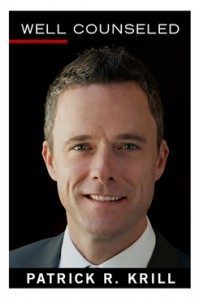Why You Should Confront a Colleague's Addiction Early
Dear Patrick:When is the best time to confront someone in the firm about their addiction? If a colleague has a problem, but nothing has really…
August 25, 2017 at 01:03 PM
5 minute read
The original version of this story was published on Law.com
Dear Patrick:
When is the best time to confront someone in the firm about their addiction? If a colleague has a problem, but nothing has really “gone wrong” for them, their clients or the firm, what is the likelihood of convincing this person or my other partners that the person needs help?
A Concerned Partner
Dear Concerned Partner:
 If someone in your firm is struggling with an addiction, the best time to address it was probably a while ago. The second-best time is now. True, the lack of (visible) consequences to the individual or the firm might make it harder to convince the person that he or she needs to make a change, but don't let that hold you back. If the person's substance use is problematic enough to have reared its head to co-workers, there is a strong likelihood that a host of things have either already gone or are currently going wrong in that individual's personal life. Work is typically the last place where a lawyer's addiction becomes apparent.
If someone in your firm is struggling with an addiction, the best time to address it was probably a while ago. The second-best time is now. True, the lack of (visible) consequences to the individual or the firm might make it harder to convince the person that he or she needs to make a change, but don't let that hold you back. If the person's substance use is problematic enough to have reared its head to co-workers, there is a strong likelihood that a host of things have either already gone or are currently going wrong in that individual's personal life. Work is typically the last place where a lawyer's addiction becomes apparent.
An important note of caution, however: It would be a mistake to blindly assume nothing has “gone wrong” for the firm or its clients, simply because the firm or the clients are currently unaware of any such problem. When a colleague is struggling with an addiction, the more reasonable assumption would be that at least some (perhaps minor, but perhaps major) things have in fact gone wrong, but that they have so far gone undetected. Experience has taught me that when you peel back the onion on a lawyer's addiction, very rarely do you find a truly unblemished record of good client service. It's the nature of the beast.
Moving beyond the consequences that may or may not already exist, however, there are three primary reasons why addressing a substance use problem sooner (also known as an “early intervention”) rather than later is always the best path.
First, addiction tends to be a progressive condition, and the longer it progresses, the harder it is to arrest. Let's not forget that addiction is a disease. While some may quibble with or dismiss that characterization outright, the medical community has long recognized addiction as a primary, chronic and progressive brain disease. Most relevant to this discussion, addiction has a known course, like other diseases, and that course is forward. Just as the prognosis for treating cancer is better in stage one as opposed to stage four, the prognosis for successfully treating addiction is better when the disease is confronted in earlier stages. The longer the disease is allowed to “hijack” the individual's brain, the more engrained the dysfunction becomes.
Second, from a practical and strategic perspective, it's important to realize that lawyers with the substance use problem will usually have more leverage later in their careers, once they are a partner, senior partner or have otherwise established themselves as more integral to a firm or practice group's financial success. Put another way, it's easier to tell associates or junior partners that they need to get help than it is a senior lawyer whose book of business and ego have grown to correspondingly appreciable girth. Ironically, and even though it's when they have the most ability to compel change, many law firms allow problems to go unaddressed for years—years in which the crisis that ultimately emerges could have been averted with far less effort and collateral damage.
Third, and most important, when you stop and consider the catastrophic destruction that active addiction has the potential to unleash at any time, intervening before the consequences begin to stack up is simply the humane thing to do. Your colleague is playing with a loaded gun, whether you, he or she realizes it. Addiction is not a disease that telegraphs its moves or gives fair warning before the wrecking ball descends. In that sense, it is predictably unpredictable, and formidably dangerous.
A wholly non-exhaustive list of potential disasters that can be precipitated by ongoing addiction include DUI's, auto fatalities, falls or other serious accidents, acute mental health crises and suicides (roughly half of those who commit suicide are intoxicated at the time). In terms of firm or client matters, a similar lack of preventability surrounds mistakes and bad behavior. Nobody in the grips of an addiction knows with any certainty when the proverbial shoe is going to drop. From a risk-management perspective, such uncertainty militates against inaction on your and the firm's part.
Have a question? Send it to [email protected] and I'll see you back here soon!
Patrick R. Krill is the founder of Krill Strategies, a behavioral health consulting firm focused exclusively on the legal industry. Go to www.prkrill.com for more information.
This content has been archived. It is available through our partners, LexisNexis® and Bloomberg Law.
To view this content, please continue to their sites.
Not a Lexis Subscriber?
Subscribe Now
Not a Bloomberg Law Subscriber?
Subscribe Now
NOT FOR REPRINT
© 2025 ALM Global, LLC, All Rights Reserved. Request academic re-use from www.copyright.com. All other uses, submit a request to [email protected]. For more information visit Asset & Logo Licensing.
You Might Like
View All
On the Move and After Hours: Bressler; Brach Eichler; Sarno da Costa; Cooper Levenson
7 minute read
Managing Partners Survey: Please Let Us Know How The Past Year Went

On the Move and After Hours: Javerbaum Wurgaft; Sills Cummis; Spiro Harrison; CSG Law
6 minute read
'Only When They Have No Choice': Has Big Law's Remote Hiring Wave Run its Course?
Trending Stories
- 1Paul Hastings, Recruiting From Davis Polk, Continues Finance Practice Build
- 2Chancery: Common Stock Worthless in 'Jacobson v. Akademos' and Transaction Was Entirely Fair
- 3'We Neither Like Nor Dislike the Fifth Circuit'
- 4Local Boutique Expands Significantly, Hiring Litigator Who Won $63M Verdict Against City of Miami Commissioner
- 5Senior Associates' Billing Rates See The Biggest Jump
Who Got The Work
J. Brugh Lower of Gibbons has entered an appearance for industrial equipment supplier Devco Corporation in a pending trademark infringement lawsuit. The suit, accusing the defendant of selling knock-off Graco products, was filed Dec. 18 in New Jersey District Court by Rivkin Radler on behalf of Graco Inc. and Graco Minnesota. The case, assigned to U.S. District Judge Zahid N. Quraishi, is 3:24-cv-11294, Graco Inc. et al v. Devco Corporation.
Who Got The Work
Rebecca Maller-Stein and Kent A. Yalowitz of Arnold & Porter Kaye Scholer have entered their appearances for Hanaco Venture Capital and its executives, Lior Prosor and David Frankel, in a pending securities lawsuit. The action, filed on Dec. 24 in New York Southern District Court by Zell, Aron & Co. on behalf of Goldeneye Advisors, accuses the defendants of negligently and fraudulently managing the plaintiff's $1 million investment. The case, assigned to U.S. District Judge Vernon S. Broderick, is 1:24-cv-09918, Goldeneye Advisors, LLC v. Hanaco Venture Capital, Ltd. et al.
Who Got The Work
Attorneys from A&O Shearman has stepped in as defense counsel for Toronto-Dominion Bank and other defendants in a pending securities class action. The suit, filed Dec. 11 in New York Southern District Court by Bleichmar Fonti & Auld, accuses the defendants of concealing the bank's 'pervasive' deficiencies in regards to its compliance with the Bank Secrecy Act and the quality of its anti-money laundering controls. The case, assigned to U.S. District Judge Arun Subramanian, is 1:24-cv-09445, Gonzalez v. The Toronto-Dominion Bank et al.
Who Got The Work
Crown Castle International, a Pennsylvania company providing shared communications infrastructure, has turned to Luke D. Wolf of Gordon Rees Scully Mansukhani to fend off a pending breach-of-contract lawsuit. The court action, filed Nov. 25 in Michigan Eastern District Court by Hooper Hathaway PC on behalf of The Town Residences LLC, accuses Crown Castle of failing to transfer approximately $30,000 in utility payments from T-Mobile in breach of a roof-top lease and assignment agreement. The case, assigned to U.S. District Judge Susan K. Declercq, is 2:24-cv-13131, The Town Residences LLC v. T-Mobile US, Inc. et al.
Who Got The Work
Wilfred P. Coronato and Daniel M. Schwartz of McCarter & English have stepped in as defense counsel to Electrolux Home Products Inc. in a pending product liability lawsuit. The court action, filed Nov. 26 in New York Eastern District Court by Poulos Lopiccolo PC and Nagel Rice LLP on behalf of David Stern, alleges that the defendant's refrigerators’ drawers and shelving repeatedly break and fall apart within months after purchase. The case, assigned to U.S. District Judge Joan M. Azrack, is 2:24-cv-08204, Stern v. Electrolux Home Products, Inc.
Featured Firms
Law Offices of Gary Martin Hays & Associates, P.C.
(470) 294-1674
Law Offices of Mark E. Salomone
(857) 444-6468
Smith & Hassler
(713) 739-1250







